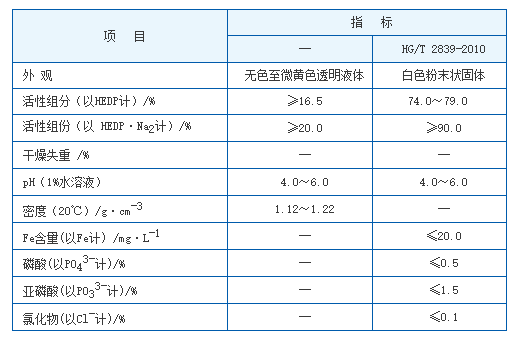Zinc HEDP Applications and Benefits in Industrial Processes
Understanding Zn-EDHP A Key Compound in the Chemical Industry
In recent years, the significance of chemical compounds in various industrial applications has gained notable attention. One such compound that has emerged as a pivotal player in this realm is Zinc-HEDP, commonly referred to as Zn-EDHP. This compound is an organophosphorus compound that has been used primarily in the field of water treatment, agriculture, and the production of various chemical formulations. This article aims to explore the characteristics, benefits, and applications of Zn-EDHP to provide a comprehensive understanding of its role in the chemical industry.
What is Zn-EDHP?
Zn-EDHP stands for Zinc Hydroxyethylidene Diphosphonic Acid. It is a zinc salt of hydroxyethylidene diphosphonic acid, which is known for its chelating properties. The molecular formula can be represented as C2H8O7P2Zn, indicating the presence of both zinc and phosphonic acid groups within its structure. These structural components grant Zn-EDHP its unique characteristics, making it effective for various industrial applications.
Benefits of Zn-EDHP
One of the primary advantages of Zn-EDHP lies in its excellent scale inhibition properties. In industrial water systems, especially in cooling towers and boilers, mineral deposits can lead to significant operating inefficiencies and potential equipment failures. Zn-EDHP effectively prevents the formation of scale by binding to calcium, magnesium, and other divalent ions, thereby ensuring the longevity and efficiency of water systems.
Understanding Zn-EDHP A Key Compound in the Chemical Industry
Applications of Zn-EDHP
'zn hedp 锌hedp'

The versatility of Zn-EDHP makes it a valuable component in various applications
1. Water Treatment Due to its scale and corrosion inhibition properties, Zn-EDHP is widely used in water treatment processes. It helps maintain the operational efficiency of cooling systems and reduces maintenance costs associated with scale formation and corrosion.
2. Agriculture Zn-EDHP is also utilized in the agricultural sector as a micronutrient fertilizer. Zinc is an essential trace element for plant growth, and Zn-EDHP provides a bioavailable source of zinc that promotes healthy crop development.
3. Chemical Formulations This compound is frequently incorporated into formulations for detergents, cleaning agents, and other chemical products. Its chelating capability is essential for improving the effectiveness of these products, allowing for better removal of dirt, stains, and other contaminants.
4. Pharmaceuticals Zn-EDHP has been researched for potential applications in pharmaceuticals, particularly in drug formulation and delivery systems.
Conclusion
In conclusion, Zinc-HEDP (Zn-EDHP) represents a crucial compound in the chemical industry, contributing to various sectors ranging from water treatment to agriculture and pharmaceuticals. Its scale and corrosion inhibiting properties, coupled with its versatility in applications, highlight its importance in ensuring the efficiency and sustainability of industrial processes. As industries continue to focus on environmental responsibility and operational efficiency, the role of compounds like Zn-EDHP will undoubtedly become even more significant over time. Understanding and leveraging the benefits of Zn-EDHP can pave the way for innovative solutions in combating the challenges faced within industrial sectors today.
-
Pbtc Scale InhibitorPBTC: A Scale Protector for Industrial Water TreatmentNewsAug.05,2025
-
Organic Phosphonate: An Efficient Defender in the Field of Scale InhibitionNewsAug.05,2025
-
Hydrolyzed Polymaleic Anhydride: Green Pioneer in Scale Inhibition FieldNewsAug.05,2025
-
PAPEMP Polyamino Polyether Methylene Phosphonic Acid For SaleNewsAug.05,2025
-
Flocculant Water Treatment: A Pioneer in Purification in the Field of Water TreatmentNewsAug.05,2025
-
Benzyl Isothiazolinone: An Efficient and Broad-Spectrum Antibacterial Protective GuardNewsAug.05,2025





